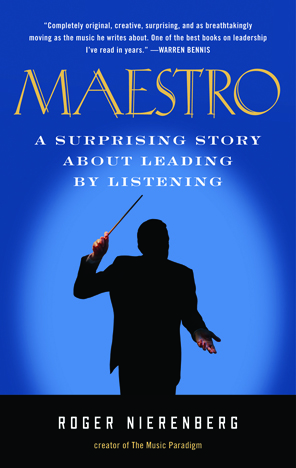Nierenberg '69 on 'leading by listening'
New book: Maestro: A Surprising Story About Leading By Listening, by Roger Nierenberg â69 (Portfolio)The author: A veteran conductor, Roger Nierenberg has served as music director for the Jacksonville Symphony Orchestra and the Stamford Symphony Orchestra and traveled the world as a guest conductor. In the last 10 years he's created The Music Paradigm, a program for corporations that uses the dynamics of a symphony orchestra as a model for business organizations. The training sessions embed corporate professionals inside a symphony orchestra to inspire leadership and teamwork by learning from the way musicians and a conductor interact. (For more about Nierenberg, read PAW's 2002 profile of the author and conductor.)The book: Written as a parable instead of a standard book of business lessons, Maestro draws on Nierenberg's real-life experiences working with clients of The Music Paradigm. It tells the story of a struggling manager who finds an unlikely source of wisdom -- the interplay between a symphony orchestra and its conductor -- and begins to think about leadership and communication in a new way. Nierenberg explains the difference between "the view from the chairs" and "the view from the podium": "In any organization, different people will see only part of what is going on. They get their information through a fairly narrow window to which they have immediate and easy access. An important part of the leader's job is to position himself to see the big picture, and the way all the parts fit together. But over time people get accustomed to the view from their window and believe it to be 'the truth.' The difference between the leader's window and the employees' window invites continual misunderstanding. A leader who understands this dilemma can communicate much more effectively with everyone in his organization."
"For example: When a musician is in the French horn section, they know their immediate goals, but the French horns cannot necessarily hear the violins. A conductor has the dual role of understanding and honoring how a piece sounds from the French horn section while simultaneously understanding how the piece must sound as a whole."
Nierenberg explains the difference between "the view from the chairs" and "the view from the podium": "In any organization, different people will see only part of what is going on. They get their information through a fairly narrow window to which they have immediate and easy access. An important part of the leader's job is to position himself to see the big picture, and the way all the parts fit together. But over time people get accustomed to the view from their window and believe it to be 'the truth.' The difference between the leader's window and the employees' window invites continual misunderstanding. A leader who understands this dilemma can communicate much more effectively with everyone in his organization."
"For example: When a musician is in the French horn section, they know their immediate goals, but the French horns cannot necessarily hear the violins. A conductor has the dual role of understanding and honoring how a piece sounds from the French horn section while simultaneously understanding how the piece must sound as a whole."
 Nierenberg explains the difference between "the view from the chairs" and "the view from the podium": "In any organization, different people will see only part of what is going on. They get their information through a fairly narrow window to which they have immediate and easy access. An important part of the leader's job is to position himself to see the big picture, and the way all the parts fit together. But over time people get accustomed to the view from their window and believe it to be 'the truth.' The difference between the leader's window and the employees' window invites continual misunderstanding. A leader who understands this dilemma can communicate much more effectively with everyone in his organization."
"For example: When a musician is in the French horn section, they know their immediate goals, but the French horns cannot necessarily hear the violins. A conductor has the dual role of understanding and honoring how a piece sounds from the French horn section while simultaneously understanding how the piece must sound as a whole."
Nierenberg explains the difference between "the view from the chairs" and "the view from the podium": "In any organization, different people will see only part of what is going on. They get their information through a fairly narrow window to which they have immediate and easy access. An important part of the leader's job is to position himself to see the big picture, and the way all the parts fit together. But over time people get accustomed to the view from their window and believe it to be 'the truth.' The difference between the leader's window and the employees' window invites continual misunderstanding. A leader who understands this dilemma can communicate much more effectively with everyone in his organization."
"For example: When a musician is in the French horn section, they know their immediate goals, but the French horns cannot necessarily hear the violins. A conductor has the dual role of understanding and honoring how a piece sounds from the French horn section while simultaneously understanding how the piece must sound as a whole."












No responses yet